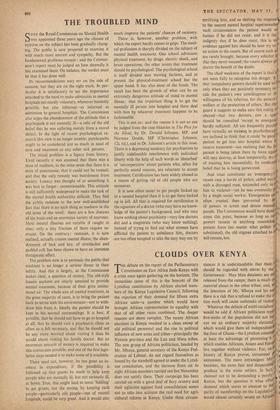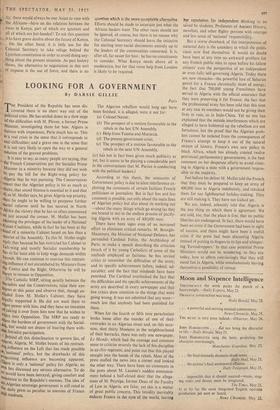CLOUDS OVER KENYA
Mk debate on the report of the Parliamentary I Commission on East Africa finds Kenya with a crisis once again gathering on the horizon. The immediate cause of this is the boycott of the Lyttelton constitution by African elected mem- bers of the Kenya Legislative Council, following the rejection of their demand for fifteen extra African seats—a number which would have brought African representation to equality with that of all other races combined. The deeper reasons are more complex. The recent African elections in Kenya resulted in a clean sweep of old political personnel and the rise to political influence of new areas and tribes—principally the Nyanza province and the Luo and Meru tribes. The new group of African politicians, headed by Mr. Mboya, general secretary of the Kenya Fed- eration of Labour, do not regard themselves as bound by the standstill agreed to under the Lyttel- ton constitution, and the increase from six to eight African members carried out last November does not satisfy them. Their campaign has been carried on with a good deal of fiery oratory and their agitation against land consolidation seems not to take into account the real need for agri- cultural reform in Kenya. Under these circum- stances it is understandable that their should be regarded with alarm by the' Government : Mau Mau detainees are stO released from the camps; there is much e material about in the other tribes; and, W the intention of Mr. Mboya and his ash' there is a risk that a refusal to make the d tion work will cause outbreaks of violent Whatever the defects of multi-racialism would be odd if African politicians repi4 five-sixths of the population did not hai'4, eye on an ordinary majority electoral which would give them an independent the lines of Ghana—the Lyttelton const at least the advantage of presenting d which enables Africans, Asians and Eurof: live together without violence. For, asAll history of Kenya proves, extremism' extremism. The more intransigent MO''' becomes, the more fear and desperatitlif produce in the white settlers. In fact, claimed not to be demanding a purely Kenya, but the question is what effect demand which seems to amount to that parity of membership on the Legislative would almost certainly secure an Africaff 110i 1(.1I
1/1
ity; there would always be one Asian to vote with the Africans—have on the relations between the races in Kenya, part of which are ignorant and all of which are hot-headed? To ask this question *Lis to have grave doubts about the future of Kenya. , On the other hand, it is little use for the Colonial Secretary to take refuge behind the Lyttelton constitution in order to avoid doing any- thing about the present situation. As past history shows, the alternative to negotiation in this sort 1, of impasse is the use of force, and there is no question which is the more acceptable alternative. Efforts should be made to ascertain just what the African leaders want. The other races should not be ignored, of course, but there is no reason why the Colonial Secretary should leave the initiative for starting inter-racial discussions entirely up to the leaders of the communities concerned. It is, after all, far easier for him : he has no constituents to consider. What Kenya needs above all is moderation, but for that some help from London is likely to be required.











































 Previous page
Previous page